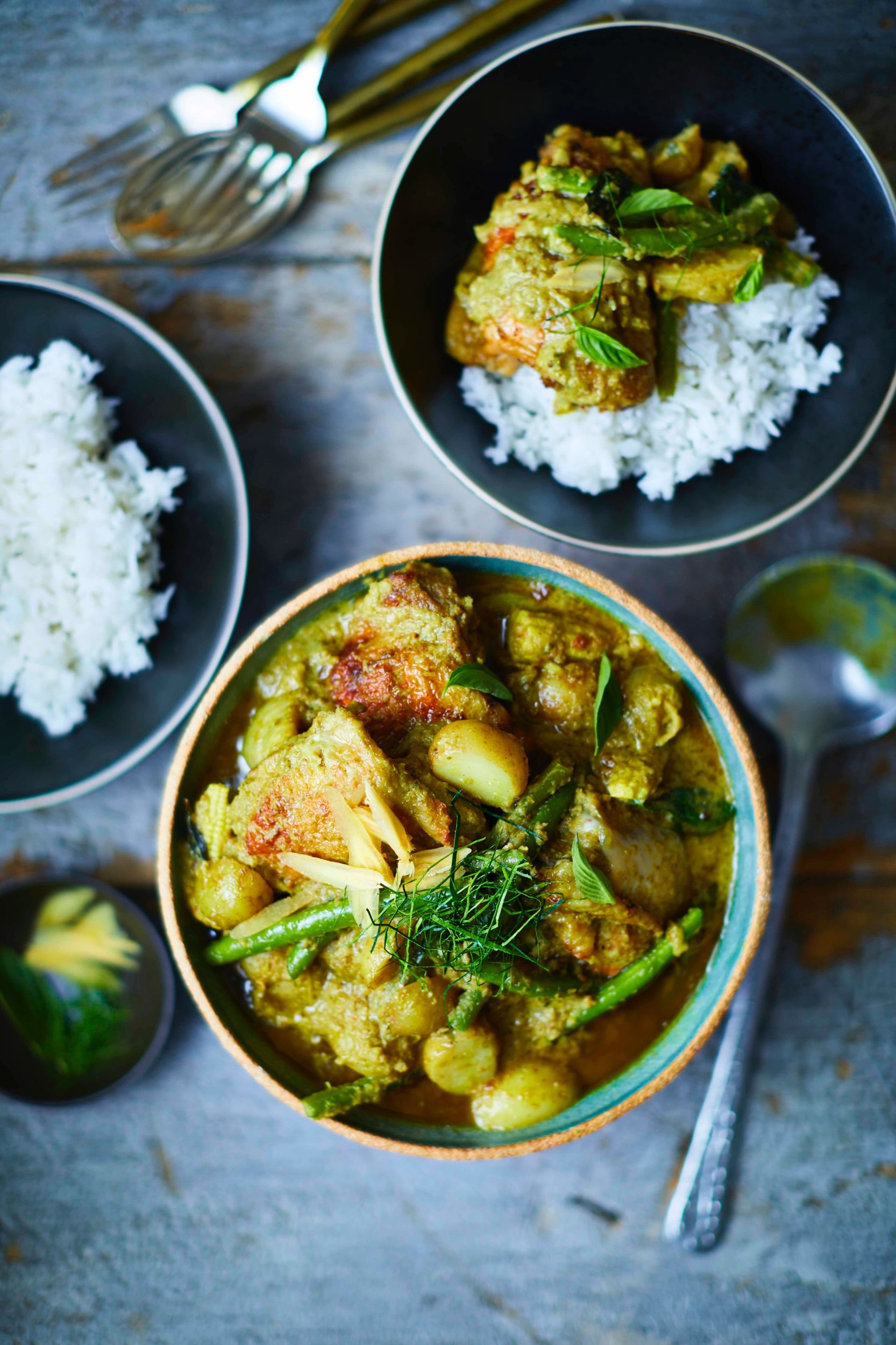Article: Three barbecue recipes to try that aren’t burgers (published in The Independent)

This article was published in The Independent. Click here to read it on their website.
There’s no reason you can’t be adventurous when cooking al fresco, says Farang chef Sebby Holmes. Spice up your grill this summer with these suggestions
We all love a good barbecue but sometimes we want something a little more than overcooked burgers and soggy salads.
There’s no reason you can’t be adventurous when cooking al fresco, says Farang chef Sebby Holmes.
When cooking chicken over a fierce heat, for example, it’s always best to marinate or brine it first. That’s what makes the chicken green curry below so packed full of goodness by the time it hits the barbecue.
The same goes for the grilled tiger prawns and citrus som tam salad. A widely eaten salad in Asia, the som tam’s clementine adds a natural sweetness to the juices of the grilled prawns, making this a stand out dish.
When cooked over an open fire, aubergine has an amazing ability to transform into a smoky, soft bombshell of flavour. The smoky aubergine, pickled cucumber and sesame salad with runny duck eggs is the perfect accompaniment to a barbecue, and also delicious served with steamed rice as a main.
Barbecue chicken green curry
When cooking chicken over a fierce heat such as a barbecue, it’s always best to marinate or brine it first. Now, you can honestly spend a lifetime researching the brining process and some people do, however we don’t have time for that! Suffice to say that by leaving raw meat in contact with salt and/or sugar and moisture before cooking, you allow it to take on flavour. This recipe uses the green curry paste to marinate the chicken, meaning it’s packed full of goodness by the time it hits the barbecue.
Serves: 2
Ingredients:
20g coconut oil (vegetable oil can also be used instead)
100g green curry Payst
3g kaffir lime leaves, torn a little to release their flavour
10ml fish sauce (if using Payst no seasoning is necessary as it is pre-seasoned)
10-15g palm sugar (if using Payst no seasoning is necessary as it is pre-seasoned)
200ml chicken stock
1 tin coconut cream
4 free-range chicken thighs on the bone (400-600g total weight)
100g new potatoes, sliced in half
80g baby sweetcorn, sliced at an angle
80g green beans, sliced in half lengthways
10g krachai wild ginger, peeled and julienned (if you can’t find this, use the larger, more common ginger)
10g Thai sweet basil
A piece of wood for smoking on the BBQ (my favourite is hickory)
Method:
Heat the coconut oil in a large saucepan over a high heat, then add the green curry paste and kaffir lime leaves and stir regularly until the paste begins to split like scrambled eggs – this will take a few minutes. You will notice that the smell of the ingredients changes from raw to fragrant. At this point, add 10ml fish sauce and allow it to cook into the paste for 1 minute (don’t add too much as it is strong and you can always add, but never take away). Next, add the sugar and cook for a minute or so until melted and beginning to caramelise – this is noticeable as the paste begins to darken.
Now it’s time to loosen the curry with liquids. Add half the chicken stock and 100ml of the coconut cream to the pan, then remove from the heat and allow to cool. When cool, use a little of the curry to marinate the chicken thighs; use enough to coat them, then refrigerate the chicken to allow the flavours to infuse for a minimum of 2 hours, but ideally overnight.
Light the barbecue and wait for the coals to glow red. Place the piece of wood onto the coals and allow to set alight and begin to smoke. At this point, add the chicken thighs skin-side up and cook for 3-4 minutes on one side, lowering the BBQ lid so that the meat is engulfed by the smoke. Turn the chicken pieces over and repeat the process until the skin is crispy and golden brown and the chicken is piping hot.
Next, return the remaining green curry to the pan and bring back to a simmer. Add any excess from the marinated chicken, then add the remaining stock. Add the potatoes and cook for about 8 minutes until they begin to soften. Add the sweetcorn and green beans and cook for a further 5 minutes until all the vegetables are softened but still retain a little bite. Add the hot chicken thighs, the remaining coconut cream and the krachai and basil. Check you are happy with the seasoning, add a little more fish sauce, sugar or coconut milk if needed and serve immediately. This dish is best served with steamed jasmine rice.
Grilled tiger prawns and citrus som tam salad
Som tam has fast become one of the most widely eaten and popular salads to come out of Asia. It originates from Lao, but now has many well-known variations from all over. This version is one I created for Farang. The use of clementine, which adds a natural sweetness, along with the juices of the grilled prawns, makes it a stand out dish. Try it with some sticky rice and some of our ginger and green sweet chilli dipping sauce for a proper feed.
Serves: 2
Ingredients:
8-10 prawns, cleaned, deveined and outer shells removed
1 tsp fish sauce
1 tsp vegetable oil
4 garlic cloves, peeled
2 tsp dried shrimp
A pinch of Maldon sea salt
1 tbsp peanuts, fried or roasted
3 red bird’s-eye chillies (more if you like it spicy)
10g green beans, chopped in 2
30g cherry tomatoes
200g shredded green papaya (can be found in most Asian supermarkets)
10-15g palm sugar
20ml thick tamarind water
Juice of 2 limes
½ lime, chopped with the zest on
Juice of 1 clementines
Method:
Coat the prawns in the fish sauce and oil, then place them on a hot grill for 2-3 minutes until the side in contact with the heat has turned pink. Turn the prawns over and repeat on the other side until they are hot throughout. Remove from the heat and set aside.
Pound the garlic and dried shrimp in a mortar and pestle, using the salt as an abrasive. Then pound in the peanuts to break them up just enough to mix through the salad; be careful not to over-pound them or they will turn into peanut butter.
Next, one by one, add the chillies, green beans, tomatoes, grilled prawns and papaya to the mortar, bruising them as you go to distribute the flavours.
Add the palm sugar, tamarind water, lime juice, chopped lime and the juice of 1 clementine. Give the salad a final bruising to ensure that all ingredients are packed full of the flavoursome dressing, making sure that the palm sugar has completely dissolved in the dressing, otherwise someone will get an unexpected sweet mouthful. Taste the dressing to check that it suits your tastes – it should be sweet, salty, sour and spicy with a hint of bitterness from the lime zest. Adjust the seasoning if necessary, then serve.
Smoky aubergines, pickled cucumber and sesame salad with runny duck eggs
When cooked over an open fire, aubergine has an amazing ability to transform into a smoky, soft bombshell of flavour. This salad, a perfect accompaniment to a barbecue and also delicious served with steamed jasmine rice as a main, uses a runny egg to contribute to the dressing. I’ve used Thai purple aubergines, which are thinner and easier to grill evenly in a short time. You can also use ordinary aubergines, but they may need a little longer on the fire. Serve drizzled in our burnt chilli dipping sauce to add an extra level of flavour.
Serves: 2
Ingredients:
4 Thai purple aubergines (these can be found in most Asian supermarket, however, the larger, more popular, aubergines can be used instead)
2 duck eggs
10g jasmine rice
10g mint, torn
10g coriander
10g Thai shallots, peeled and thinly sliced (banana shallots can be used)
1 tsp toasted sesame seeds
For the pickle:
2 tbsp caster sugar
½ tsp table salt
50ml distilled white vinegar
¼ cucumber, thinly sliced
For the dressing:
Juice of 3 limes
Juice of 2 clementine
2 tsp fish sauce (seaweed sauce can be used as a vegetarian substitute)
½ tsp chilli powder (a little less if you don’t like things too spicy)
2 tsp caster sugar
3 tsp tamarind water
Method:
Light the barbecue and place the whole aubergines directly onto the hot coals, or near the hottest part of the grill if you’re using a gas barbecue. Keep a close eye on them and turn them over frequently, ensuring that the heat from the coals is distributed evenly. The aubergines are ready when they are soft to the touch, with charred and blistered skins. When cool enough to handle, peel off the skin. If you are not using a barbecue, crank the oven right up to full blast and bake the aubergines until the skins are charred and the flesh is soft – this will take 20-25 minutes.
Meanwhile, soft-boil then peel the duck eggs. An average-sized egg takes 6-7 minutes to cook on a rolling boil. I cook mine in salted water, then transfer them into ice-cold water with a splash of olive oil. If you peel the eggs in the water, the oil gets between the shell and the flesh, making them easier to peel. Once peeled, set aside at room temperature.
Put the rice in a dry frying pan and lightly toast on a medium heat, shaking the pan constantly until the grains have turned golden brown and release a lovely aroma. Pound the rice into a powder in a granite mortar and pestle, or use a spice grinder. Make sure to grind the rice to a powder as it will be used to add texture to the salad; it will be crunchy if the grains are too coarse.
Next, make the pickle. In a medium saucepan, gently heat the sugar, salt and vinegar together with 50ml cold water until the sugar has dissolved. Be sure to keep stirring so that the sugar dissolves without heating the water too much. Remove from the heat and add the cucumber, then refrigerate.
Make the dressing. In a bowl, mix the lime and clementine juices, the fish sauce, chilli powder, sugar and tamarind water. Taste and adjust the dressing to cater to your own taste buds: it should be sweet, salty, sour and hot, with an edge towards the salt and citrus. When you’re happy with the flavour, add the aubergines, mint, coriander, shallots and the pickled cucumber (straining any pickling juices before adding), then gently fold together, leaving the aubergines whole if you can be delicate enough.
Put the aubergines on a serving plate and place the duck eggs on top. Using the tip of a knife, pierce a hole in the eggs and break them open with your fingers, releasing the runny yolks so that they ooze into the salad. Sprinkle the salad with the rice and sesame seeds and add a tiny pinch of salt onto the runny egg yolks as a surprise burst of flavour. Serve with steamed jasmine rice for an extra fill.
Head chef & founder of Farang London restaurant. Cookbook author of ‘Cook Thai’ & ‘Thai in 7’. Chief curry paste basher and co-founder of Payst London.
